Combine Fields
Combine imaginative fields within composition to create a unique profile and a unique portfolio
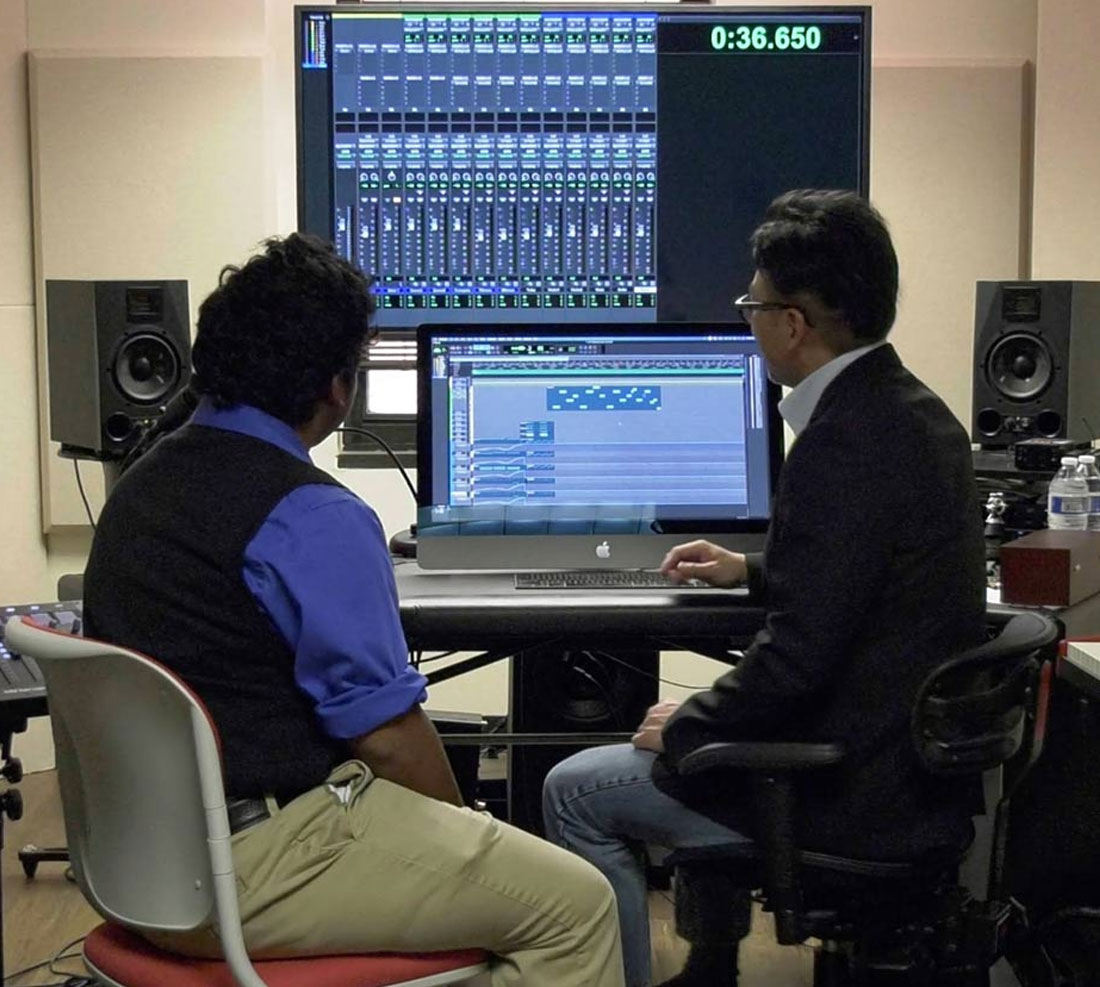
The Doctor of Musical Arts degree is oriented toward professional practice in music composition emphasizing the creation of musical works. The degree culminates in four doctoral composition projects, the last of which is the capstone major composition project. The projects are designed to suit the professional interests and aspirations of the student.
The Doctor of Musical Arts (DMA) in Composition at TTU is designed to provide the composer with a professional portfolio of music compositions and professional skills in preparation for careers in an ever-growing array of fields involved with the creation and design of music, including media music—commercial, video-gaming, film scoring, recording/engineering studio training, sound for animation, and music informatics—as well as careers as professional composers and in academia. We have established faculty for the long-standing emphases in computer music and traditional composition (chamber, wind band, orchestra, vocal, and choral areas). The flexibility built into the program allows the candidate to pursue coarse work that can lead to various career paths.
The DMA in Music Composition degree provides opportunities to explore education and creative experiences in many of the new music avenues that are now so easily accessible—media, commercial, recording, and computer music are available fields with opportunities to be explored with the help of our world-class faculty. The final doctoral project allows wide flexibility with a goal towards performance and career enhancement, and so can encompass an array of possibilities including traditional large ensemble works, but also chamber works, electronic works, mixed media, and music informatics (an emerging field for designing complex software and hardware-based music technologies). We particularly encourage interdisciplinary capstone projects that could incorporate a music composition with film, dance, theater, and other imaginative collaborations with a goal of live performance, recording, and filming to enhance the candidate’s media exposure and reputation as part of their career development.

Combine imaginative fields within composition to create a unique profile and a unique portfolio

Combine music of any kind with the visual, dance, and theater arts

Help create career defining pathways by combining music with art installations, film, and dance works

Music Media is a fast-growing field within the composition discipline
Our composition program includes intensive study in the creation of original music. We offer traditional focuses on either or both acoustic instrumental music and computer music, and have expanded into the fields of media composition where the creator can design and assemble a professional portfolio that is on the cutting edge of national and international standards. Performance opportunities abound as our talented performance students and faculty lend their musical skills to our composition projects, and our new technology areas can collaborate to realize your works.
The capstone project is the final of a set of four doctoral projects, all with particular attention to building a compelling and impressive portfolio of creative works. We seek for the candidate to have the ability to excel in one or a number of different compositional pathways. The paper may be on any relevant subject matter of interest with the goal of perfecting writing skills and developing publication potential.
Teaching Assistantships are available through both the Composition and Theory Areas to provide teaching experience for our candidates. The program requires 45 hours of coursework beyond the master's degree, with a capstone doctoral creative project.
There are four doctoral projects that represent the capstone of the DMA in Composition. They begin with a portfolio review, with attention given to the breadth of genres and media represented, mastery of orchestration and notational practice, or conversely, mastery of media and application processes, issues of performance practicality, and the presence of both a personal aesthetic and distinctive compositional voice. Performances of new and/or existing works are expected. The last two projects involve a significant original work and accompanying document. With the approval of the candidate’s committee, we encourage both traditional types of work as well as any kind of interdisciplinary work. Pursuing new and imaginative ideas is especially endorsed.
Beginning in 2020, we undertook major upgrades to our production facilities. Concert venues and studios are interconnected through Dante and NDI networks, enabling high-quality and efficient audio and video production workflows. The School of Music Media Production Studio is equipped with a comprehensive range of industry-standard, high-end tools that support cutting-edge research, professional sound and video production, and the design of music-related devices utilizing Arduino and Teensy platforms, various sensors, and 3D printing technologies.
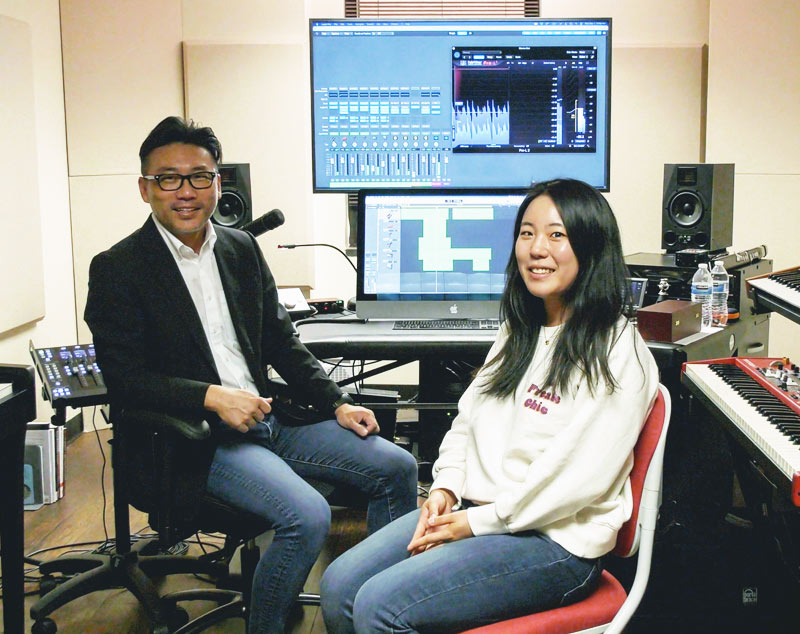
Composition faculty have additional resources for advanced music and media generation as part of their offices.
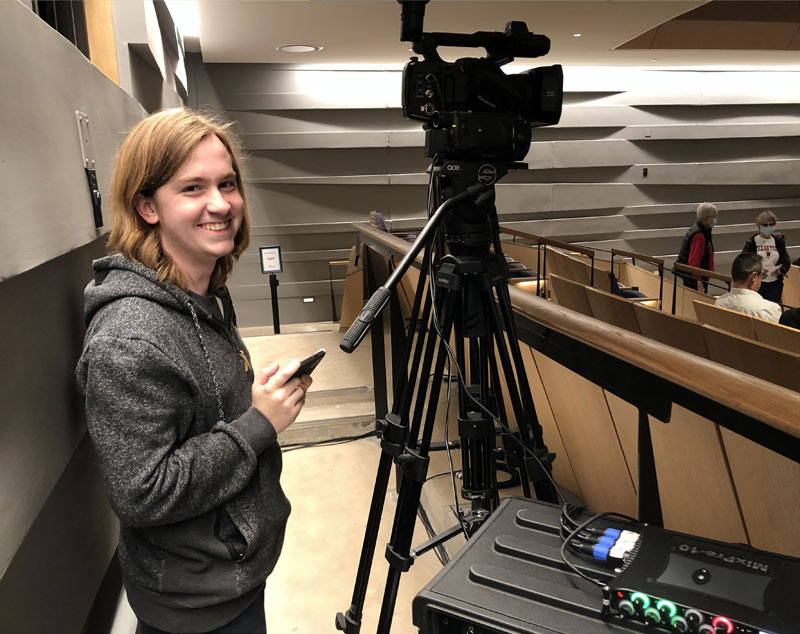
Experience using professional 4K video cameras and advanced recording techniques
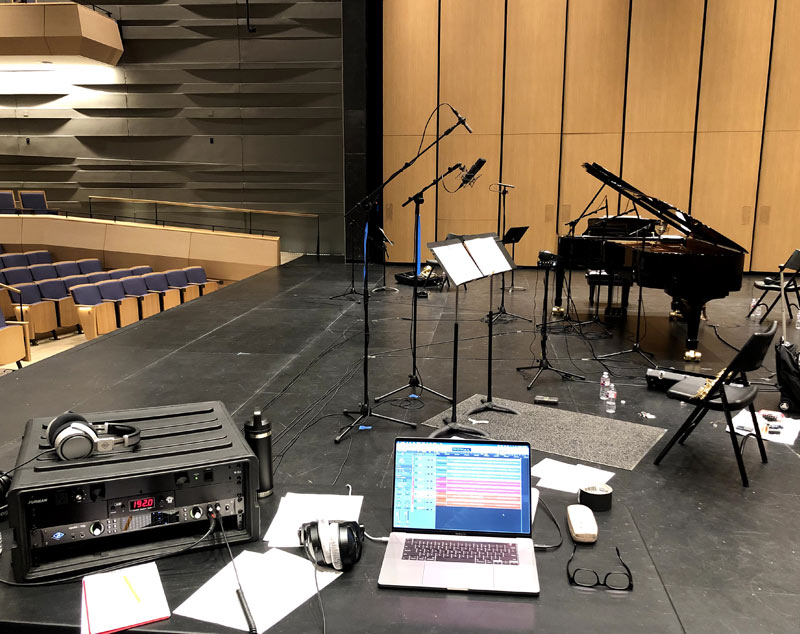
Computer Music, Recording Technology, and Music Informatics courses provide comprehensive, in-depth education, research, and training in music technology.
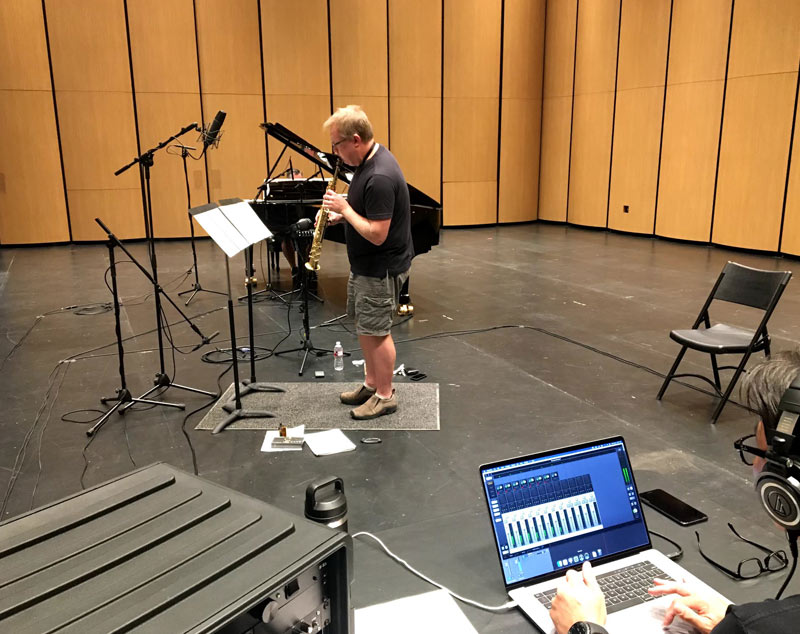
Experiences in studio and live recording, as well as recording engineering are available, both as courses and/or employed work-study programs
We welcome students from many different backgrounds and experiences. Entering first-year students with limited composition experience will take an Introduction to Composition class that will begin the process of understanding the many different paths/tracks to take. The class will emphasize an understanding of a variety of musical languages and the many different kinds of composition in today's world. Of course, there will also be composing, with the goal of public performances of your works. Individual lessons within a faculty studio will normally begin after taking this Intro class. Students with a large and developed portfolio will usually be assigned studio lessons.
To be accepted into one of the Master's or Doctoral Degree programs in music, the applicant must be approved by the School of Music and admitted by the Texas Tech Graduate School. Instructions are here: Application Procedure [link to]
If applying for a media emphasis, again a portfolio is required. Please choose up to three representative works in audio/video format. Since these works are often without a score, please also provide written information on the applications used, and the process used to create each submission.
A list of compositions, each with instrumentation, duration, year composed, performance info if available; if media compositions, each with the same information, but also include apps used.
Other musical activities (teaching, organizing, conducting, etc.)
Technology skills—music (notation programs, DAW's, music programming languages, sound apps)
Technology skills—other non-music applications (computer programming and languages, web design, productivity, video editing, graphic design, etc.)
Kimberly Calvert-Gibson
Graduate Coordinator
806.834.0616
Some of our popular course offerings include:
A course in designing interactive environments for live instruments and sound design. The course has a capstone music composition project that can be performed on the TTU Computer Music Concert (the T-Tech Concert). Long term projects are encouraged as part of a larger musical vision that can become a major part of your portfolio works.
New courses that are designed as part of our commercial music degree plan. Graduate students may design their curriculum to include these popular and job-oriented courses into their program. The courses explore the latest creative methods and technology in sound and video productions, including live concert recording/filming, ADR for Anime, and more. Hands on experience in mic placement, DAW work, mixdown, and engineering are invaluable experiences we are proud to offer our students.
Explores new possibilities in a combined field of music, science, and technology, through developing electronic musical instruments using Arduino and other devices. Further study explores the advanced use of technology in music and media productions through developing new electronic musical instruments/devices using Arduino/Teensy, sensors, and a 3D Printer.
Media Music
Commercial Music
Film Scoring
Video-Gaming Music
Recording/Engineering Studio Training
Sound for Animation
Music Informatics
Professional Composer
Academic Teaching Positions